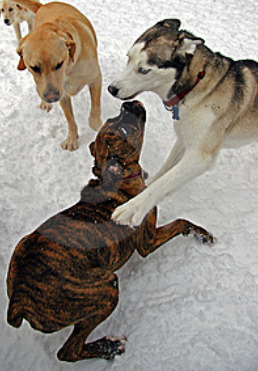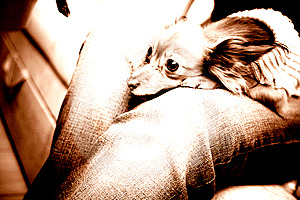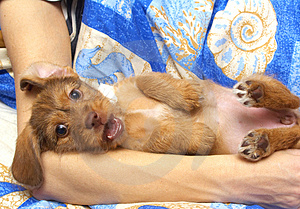|
Alpha Dog BehaviorUnderstanding How Dogs Think Understanding alpha dog behavior and dominance aggression is helpful in understanding and properly training our dogs. No matter how much we love our dogs, it's important to remember for the sakes of both ourselves and our dog, that we are "top dog". Dogs are not human. No matter how much we think we know what they're thinking, dogs do not have the same human capacity for thought. The first thing you need to understand when teaching or disciplining your dog is that you must always do so at the time they commit the bad act. If you come home to a torn sofa or garbage on the living room rug that they placed there - my wonderful dog does this - you cannot get mad at them, as hard as that is. Now yes, I've come home to garbage in the living room and gotten mad, but this doesn't teach my dog a thing. All she understands is that when I saw garbage on the floor, I got mad. She cannot connect the dots and understand that I'm mad because SHE put the garbage on the floor. She just knows that when I got home and saw the garbage, I got mad. This causes her to slink away, because she doesn't like that I'm mad. Period. She does not know that I'm mad because SHE did it. Sometimes that's hard to remember. I try to remember this and I've tried to explain this to my teenage daughters, as well. They have come home to things of theirs that she has chewed and they have yelled at her, and in turn gotten mad at me - because that's what teenage girls do. I've told them that this does no good, (getting mad at her), (or me for that matter!) as she cannot connect her naughtiness to them being mad. Now that that's clear, we can move on to understanding alpha dog behavior and what it means to be the alpha dog. For this, we need to remember that dogs are a pack animal, descendents from wolves. In a pack, there is one leader, one alpha dog. In a family situation, there may be more than one pack leader. In fact, all humans need to be the leader of the dog. Your dog needs to learn that the humans in his pack are the ones in charge, and that he is not allowed to display alpha dog behavior.

Though of course, domesticated for centuries now, dogs maintain an animal instinct. You only need to watch a mother dog or cat nurse or clean her babies to understand animal instinct. No one teaches them how to do this; they just do it. Dogs also do things like chew your furniture, soil your carpet, bark too much, jump up on you or people who come to your home. These are things dogs do - because they are dogs. You, being a human, have to teach them not to do these things, or your dog will think he's in charge and will continue to exhibit alpha dog behavior.
Dog Behavior I compare poorly behaved dogs to poorly behaved children. If children aren't disciplined, or are not taught manners, they will do naughty things and act rudely. They don't know any better. It's the same with dogs. So, to live in harmony with your dog, you must teach him how to behave. You need to begin teaching your dog at an early age, or as soon as you bring him home for best results. And, as with children, you must continue to teach throughout your dog's life and be consistent in order to have a well behaved pet. You, not your dog, must be the "alpha dog" by exhibiting alpha dog behavior - that is, you must be the leader, the one in charge, or your dog will walk all over you - quite literally, even. When I first adopted my dog Sydney, my Newfie/Lab, she was two and a half and she thought she was the alpha dog and she exhibited alpha dog behavior. She weighed close to 70 pounds, and she was not easy to control. When we were indoors, she was sweet and mellow, but I had been told by the adoption center that she was aggressive with other dogs, so I was prepared for this when we went for our walks. Whenever she saw another dog, I would get nervous and she would go berserk. She was very strong and pulled me down more than once. I was walking her on a trail one day when a man approached with his dog. Syd behaved in her usual way - pulling hard on the leash and jumping and growling at the dog. I got her under control and talked to the man about her, explaining that I had adopted her and this was her usual behavior around other dogs. He asked if he could take the leash for a minute and he was able to calm her, so much so that she and his dog both ended up off their leashes and walking around doing their own thing - sniffing the shrubbery and pretty much ignoring each other. This proved to me a few things - that she was acting as the alpha dog, the one in control; that she could be polite and well behaved around other dogs; and that she had not been given that opportunity with her original owners. Soon after this incident, a male friend of mine took her for a walk off leash and told me she had been well behaved and got along fine with other dogs she came in contact with. This was a big turning point in our life with Sydney. I began taking her places where she could walk off leash and she became a new dog. A few things changed. She learned how to run and play. When we first got her, she got tired easily and ran slowly. This was crazy, as she is part Lab. She started swimming, something she was afraid to do when I first got her. That was crazy, as she is part Newfoundland too. She learned to fetch a ball and she started playing with other dogs, running after them and being chased - probably the most fun new thing she learned to do. Now when I walk her on a leash she's much more calm. Sometimes she gets a little anxious, depending on the other dog's reaction to her, but I am no longer nervous, and I know she feels my calmness, and in turn, she is calmer. We go to the off leash dog park frequently and she is well behaved. So, you see, you CAN teach an old dog new tricks! And both of you will be happier. Sydney had obviously not been properly socialized when we first adopted her. Besides having to retrain her how to walk on the leash and act around other dogs, we had to correct her stubborn streak. There were times when we'd be on a walk and I'd start to head home and she would just stop and lie down in the middle of the road. Or, once home she'd lie down outside and I couldn't get her to move. I believe she believed she was the one in charge. Well, why not, I couldn't control her. That's why you really need to start teaching your puppy from about 12 weeks who's in charge. If you have a large breed dog, this is especially important because they will become physically hard to control. If you have a small breed dog, it's much easier to ignore bad behavior, but if you do, you may cause your dog to have what is known as "small dog syndrome" which means your tiny dog thinks he's in charge. If you fail to show leadership and allow that tiny dog to get its way much of the time, you will spoil it (again, just like when children are allowed to get their way*), and it will start to call the shots. Remember, you are the one that needs to be in charge! If a dog is allowed to be in charge, he may become aggressive, or she simply may not listen to you, as Sydney chose before we taught her. We did this by being consistent and not allowing her to get her way. It's not always easy. But it's worth it. Some breeds are naturally more aggressive and some dogs simply have more of a predisposition to aggression, but whatever the case, early training is necessary. I was lucky in that Syd was never aggressive toward us, and she has never been aggressive toward any human. But who knows how she would be now that I've had her for three years if her aggression toward other dogs had not been curbed?
A small dog will try to act larger than life to protect itself and its own interests. The term refers to small dogs that act nasty and become little terrors. Little in size that is, but their terrible behavior is big. Aggressive behavior by small dogs can almost always be blamed on the dog's owner. I think it's extremely important for dog owners to treat their dogs like dogs. I love my dog with all my heart, and I spoil her, and I don't always make her behave like the best behaved dog, BUT I try to make sure she is polite around other people. And she has never been mean to our friends, or strangers or our cats. This I would not tolerate. She's big, so she may seem scary to some people, so though I know she's a sweet dog, I have to remember that.

I would like people to help toy sized dogs gain a better reputation. Tiny dogs are easy to spoil. They are frequently allowed to jump up on you, to share your couch, or to share your bed. People are more tolerant of tiny dog's that misbehave as it is perceived as inconsequential. And tiny dogs are pampered and babied. We feel protective of them because they are so little. Tiny dogs are are often carried rather than made to walk. This results in alpha dog behavior that give these little guys and girls their bad reputation with people who think of them as yappy and spoiled.

I go back to comparing dogs with children. When my children were little, even babies, and they fell, I would tell them (after a quick assessment to make sure they weren't hurt) to pop back up. I didn't want a wimpy kid. Small dogs need to be treated in the same way unless you want a wimpy, spoiled dog prone to alpha dog behavior that includes growling and biting when he doesn't get his way. A small bite might hurt less, but it still hurts. It can still get you in legal trouble and it can do permanent damage to a small child. Do not let a dog's small size give you an excuse to be tolerant of poor behavior. Train your small dog as you would a large dog. You, the human, must be in charge so that you, your tiny pooch, and your friends and neighbors, can live in harmony. Allowing alpha dog behavior by a tiny dog can be just as annoying as allowing your large dog to be misbehaved. Return from Alpha Dog Behavior to Basic Dog Care
|





